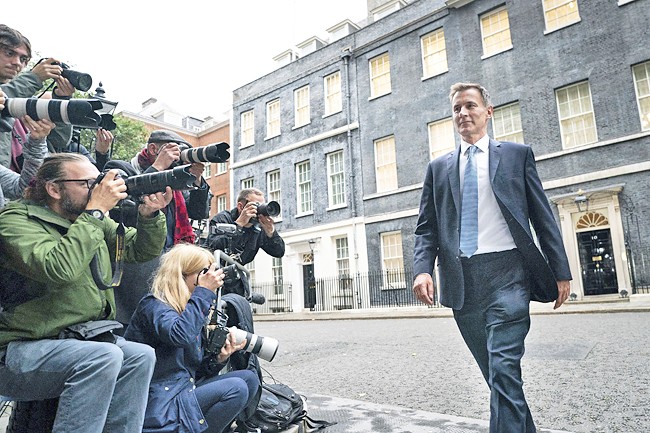LONDON (AP) – United Kingdom (UK) Treasury chief Jeremy Hunt yesterday reversed most of an economic package announced by the government just weeks ago, including a planned cut to income tax.
In a bid to soothe turbulent financial markets, Hunt said he was scrapping “almost all” the tax cuts announced last month and signalled public spending cuts are on the way. He also scaled back a cap on energy prices designed to help households pay their bills. It will now be reviewed in April rather than lasting two years.
“It is a deeply held Conservative value – a value that I share – that people should keep more of the money that they earn,’’ Hunt said. “But at a time when markets are rightly demanding commitments to sustainable public finances, it is not right to borrow to fund this tax cut.”
Hunt was appointed on Friday after Prime Minister Liz Truss fired Kwasi Kwarteng, who spent less than six weeks in the Treasury job. Truss and Kwarteng jointly came up with a September 23 announcement of GBP45 billion (USD50 billion) in unfunded tax cuts that spooked financial markets, sent the pound to record lows and forced the Bank of England to take emergency action.
Yesterday’s hastily scheduled announcement came two weeks before Hunt is due to set out a medium-term fiscal plan.
The government had already ditched parts of its tax-cutting plan and announced it would make a medium-term fiscal statement on October 31. But the market remained jittery, and Hunt has decided he must make a statement to calm the waters even sooner.
Hunt will also make a statement to the House of Commons.

Hunt spent the weekend in crisis talks with Truss, and also met with Bank of England Governor Andrew Bailey and the head of the government’s Debt Management Office.
Hunt’s moves are aimed at restoring the government’s credibility for sound fiscal policy after Truss and Kwarteng rushed out a plan for tax cuts without detailing how they would pay for them.
The unfunded tax cuts fuelled investor concern about unsustainable levels of government borrowing, which pushed up government borrowing costs, raised home mortgage costs and sent the pound plummeting to an all-time low against the dollar.
The Bank of England was forced to intervene to protect pension funds squeezed by volatility in the bond market.
Hunt was under pressure to act before financial markets opened yesterday because the central bank’s support for the bond market ended on Friday.
The early response from investors was positive.
The pound rose 0.5 per cent to USD1.1229 in early trading in London. The UK currency is now trading for roughly the same price it was on September 22, the day before Kwarteng announced the tax cuts.
Yields on 10-year government bonds, an indicator of government borrowing costs, fell to 4.060 per cent from 4.327 per cent on Friday. It was 3.495 per cent on September 22.
Bond yields tend to rise as the risk of a borrower defaulting increases and fall as that risk declines.
But analysts warned the positive market news might only be a temporary reprieve.
“Trussenomics may have been ripped up and fed to the shredder but the author of the big riskremains in power, and has the final say on the direction of travel,” said senior investment and markets analyst at Hargreaves Lansdown Susannah Streeter.
“Investors are craving more stability but, given the flip-flopping we’ve had so far in her super-short tenure, economic policy uncertainty remains and that’s likely to be the key driver in the bond markets and on foreign exchange desks,” she said.
The financial fiasco turned Truss into a lame-duck prime minister, and Conservative lawmakers are agonising about whether to try to oust her. She took office just six weeks ago after winning a party election to replace prime minister Boris Johnson.






